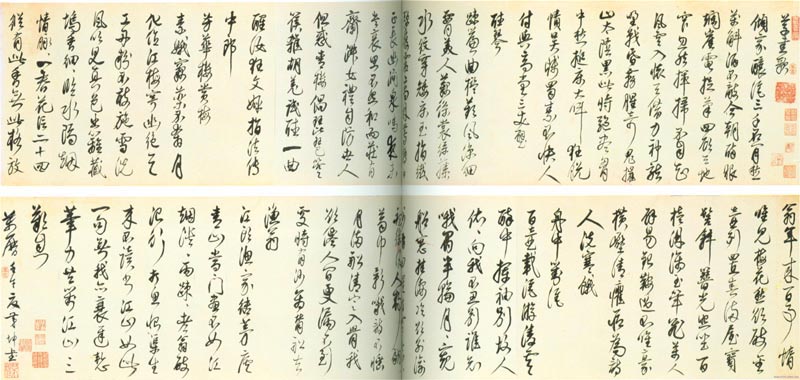Mao Kun (1512-1601) Ming prose writer. The courtesy name is Shunfu and the nickname is Lumen. He was born in Hualin, Gui'an, Zhejiang Province (now Huzhou). He became a Jinshi in the 17th year of Jiajing reign of Ming Dynasty (1538). He successively served as magistrate of Qingyang and Dantu counties. Because of his meritorious service in disaster relief, he was promoted to the head of the Ministry of Rites, and then the Director of Jixun of the Ministry of Personnel, and was later demoted to Tongpan of Guangping. He also repeatedly moved to Guangxi to prepare for military affairs. He likes to talk about war, is good at strategy, and is familiar with military affairs. He once assisted the Governor Ying Yao in suppressing the uprising of the rebels, defeated seventeen villages in a row, and was promoted to the deputy military envoy of the famous name. The governor-general Yang Bo appreciated his talent and recommended him to the court. However, Mao Kun was slandered by the emperor and dismissed from office and returned home, where he stayed for more than 50 years. At the end of Jiajing, Japanese pirates repeatedly invaded Zhejiang and Zhejiang. Mao Kun was invited by Hu Zongxian to serve as an aide to discuss military opportunities. Later, Hu Zongxian's experience of trapping and killing the bandit leader Xu Hai was compiled into one volume of "The Complete Story of Xu Hai". Because his family ran rampant in the countryside, he was impeached by the governor Pang Shangpeng, so he reduced his status and returned home to devote himself to writing. He died at the age of ninety.
Mao Kun was good at ancient prose and deliberately imitated Sima Qian and the Eight Great Masters of Tang and Song Dynasties. In response to the ancient argument of the seven scholars at that time that "literature must be related to the Qin and Han Dynasties", they put forward the argument that "the rise and fall of literary characteristics is related to Tao, and it is not determined by the times." It is believed that in the Han, Tang and Song dynasties, "the prosperity of Tao means the prosperity of literature" During the period, the ancient prose of the Tang and Song Dynasties was particularly respected, and together with Tang Shunzhi, Wang Shenzhong and Gui Youguang, they were called the "Tang and Song School". His writing is full of ups and downs, but it is limited to the literary conventions of the Tang and Song Dynasties, and sometimes shows traces of imitation. He is the author of 8 volumes of "Yin Manuscript", 22 volumes of "Yuzhi Shanfang Manuscript", 7 volumes of "Old Year Records", and "The Chronicles of Zhejiang Branch", etc. A well-known scholar is "Mao Lumen Collection". The selection includes "Historical Notes", "Ouyang Historical Notes" and other books. The collection of books is very rich, and at that time "the most powerful person in the sea". The "Baihua Building" was built in Lianshi to house books. He has compiled a bibliography, divided into nine studies and ten parts, and has written 11 volumes of "Baihualou Collection of Manuscripts" and 15 volumes of "Continuation of Manuscripts".

Mao Kun's "Xing Cao Lu You Poems"








